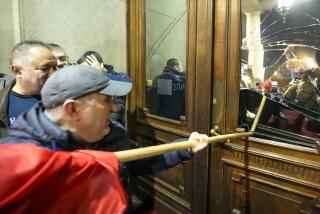Labor Is Missing Link for Serbian Opposition
NIS, Yugoslavia — Gathered in this southern industrial city under an equestrian monument to Yugoslavia’s wars of liberation, several thousand demonstrators Saturday repeated the daily ritual of cheering for an end to the authoritarian regime that they believe stole recent elections.
But in a muddy open-air market where unemployed factory workers hawk smuggled goods to survive, no one was talking much about the political protests downtown.
“We have a [political] system, so why do they think taking to the streets will change anything?” said a 51-year-old father of two who lost his job in a furniture factory three years ago.
Outrage over Serbian President Slobodan Milosevic’s decision to void municipal elections that his Socialist Party lost last month has fueled a growing wave of anti-government protests, the most serious challenge ever faced by the Balkan strongman. In Belgrade on Saturday, massive crowds that some reports estimated at 100,000 again marched through the streets and paralyzed the Serbian and Yugoslav capital.
But if the opposition is to pose a real threat to Milosevic’s stranglehold on power, it is seen as essential that the movement broaden beyond Belgrade students and professionals to embrace disaffected workers in strategic cities like Nis.
A visit Saturday to Nis, the second-largest city in Serbia and hub for the southern half of the republic, suggested that opposition leaders have not yet achieved this. Many workers, who either are out of work or have not been paid in months, seemed to feel little connection to the protesters. Some said they had “heard” of the demonstrations but did not know what they were about.
“Probably 80% of the people here would agree with what they say, but who has time to go to demonstrations?” said a 45-year-old unemployed father of four who was selling plastic bags at the market.
Opposition leaders united in a loose coalition known as Zajedno (Together) have only now begun to establish contacts with sympathetic labor union officials, who would have to be recruited for any kind of organized worker participation in the demonstrations. The largest unions are controlled by the state.
But Nis is a city ripe for dissent. A traditional stronghold of Milosevic’s Socialists, it is now a prime example of rampant government corruption and economic mismanagement, where sprawling factories sit virtually idle.
It is also a city that Milosevic apparently could not bear to lose: According to diplomats and election monitors, Nis was the scene of some of the most blatant fraud on election night, including the altering of numbers on vote-count tally sheets, in an effort to snatch victories away from opposition candidates.
“They didn’t even bother to use correction fluid,” Zoran Zivkovic, head of the local chapter of the opposition Democratic Party, said in describing the doctored results.
Zivkovic charged that thugs thought to be working for the Interior Ministry barred opposition monitors from the vote count.
The inspiration for much of the anti-government anger to be found in Nis comes in the form of local Socialist chieftain Mile Ilic, a gregarious party apparatchik with a bushy mustache who opponents claim has used his position to enrich himself and a small group of friends--a pattern common throughout Milosevic-run Serbia.
While the walls of the local children’s hospital crumble, Ilic has overseen the construction of nine shopping malls in this city of 280,000, plus a pedestrian mall. Zivkovic and other opponents contend that money from these projects that should have gone to the city has instead benefited members of the ruling party.
Ilic, who could not be reached for comment, has said that his efforts fostered a building boom that has transformed Nis from a tawdry village to an important European city.
Last year, Ilic published a 300-page homage to himself, a book that collected 45 interviews he’d given to local journalists and featured dozens of pictures of himself. The book was so self-promotional that even Milosevic is said to have been offended. It certainly disgusted a large number of Nis voters, many of whom said they were voting against Ilic when they voted for the opposition.
*
Nis underscores other challenges facing the opposition. Among local Zajedno officials and supporters, there was confusion and doubt about what the coalition’s next move would be--and whether it would be able to sustain its momentum or accomplish any real change.
No national Zajedno leader had visited Nis, despite its size and strategic importance, since Nov. 19, two days after the disputed election. The local Zajedno leaders eagerly asked a visiting reporter for news about what was happening in Belgrade. Milosevic’s government controls all national media.
In addition to state control of the media, another obstacle faced by the opposition is a formidable police force loyal to Milosevic. As they have done in other cities, government authorities have bused more than 1,000 special state police into Nis to control the protest crowds. Most appeared to have come from the restive Kosovo region of Serbia, judging by the license plates on the buses that brought them.
“I don’t think the opposition will win in the end,” said a Nis tourist agency operator who is married to a police officer but who supports the opposition. “Everyone is afraid [the Socialists] won’t give up power and then things will be worse.”
More to Read
Sign up for Essential California
The most important California stories and recommendations in your inbox every morning.
You may occasionally receive promotional content from the Los Angeles Times.











